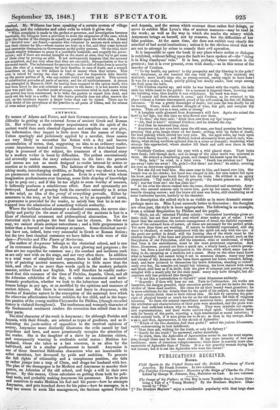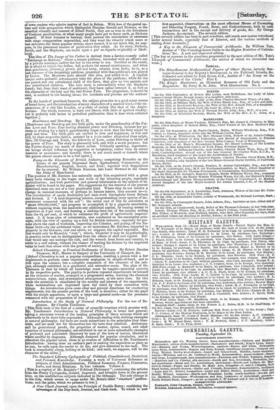PUBLICATIONS RECEIVED.
BOOKS.
Field Semis in the United States and the British Provinces of North America. By Frank Forester. In two volumes.
The Fairfax Correspondence: Memoirs of the Reign of Charles the First. Edited by George W. Johnson, Esq., Barrister-at-Law. In two volumes.
The Image of his Father; or One Boy is more Trouble than a Dozen Girls: being a Tale of a " Toting Monkey. By the Brothers Mayhew. Illus- trated by "Phia." C" The Brothers Mayhew" enjoy a considerable popularity with that large class
of town readers who admire matter of fact in fiction. With less of the genial na- ture and wide sympathies which distinguish Douglas Jerrold and Dickens, or the smartish vivacity and manner of Albert Smith, they are as true in the literalness of Cockney peculiarities, or what many people have got to fancy such, as Dickens himself. If their humour is farcical, their persons the extremities of extremes with stage exaggeration superadded, and they want the vivacity which more or less animates the three popular writers above named, it is not much felt, we sup- pose, in the piecemeal manner of publication they adopt. As for story, Dickens, Smith, and the Mayhews, are much upon a par as regards originality or likeli- hood.
The idea of The Image of his Father is derived from a fareieo-comedy called "Exchange no Robbery," where a tenant publican, intrusted with an officer's son by a private marriage, suffers the boy to ran away to sea. Terrified at the result, he is afraid to inform the father, but pockets the annual remittances; and when that gentleman, (Farren,) grown old and testy, returns from India, he is, as a last resource of the despairing publican, presented with that publican's son, played by Liston. The Mayhews have altered this idea, and added to it. A roguish lawyer ands pedantic schoolmaster take the place of the publican; while for the one parent and one substituted child of the farce, they give us two parents and two substituted children. The love story is substantially what the Mayhews found; but, from their want of sentiment, they have rather lowered it, as well as the.character of the lady and the real Simon Pare. The plagiarism, it should be said, is confined to the leading ideas; the incidents and persons are the authors' own.
In the hands of practised farceurs, the subject gives rise to a good many scenes of broad farce, and the introduction of many characters of a marked kind,—the ex- crescences of a city like London, or a state of society like that of the Anglo- Indians. The whole, however, is hard and literal, with little of spirited vitality: but it probably told better in periodical publication than it does when collected together.]
Heartsease and Dewdrop. By C. M.
[Heartsease and Dewdrop are two little girls, under the guardianship of the Fai- nes Love and Fear; Fear having obtained power over Dewdrop, because her pa- tents in wishing for a fairy's guardianship forgot to wish that the fairy might be good and wise. The little girls are excited to love and happiness, or fear and evil, by their respective fairies, assisted by a train rather allegorical than sylph- like; till Courage and Truth, the followers of Love, assist Dewdrop to throw off the power of Fear. The story is pleasantly told, and with a moral purpose; but the Fairies display too much of direct action. Critically speaking, supernatu- ral beings should influence by suggestion or temptation, rather than by actual coercion or assistance; and morally, there is not much merit or demerit where the person almost ceases to be a free agent.] Essay on the Elements of British Industry; comprising Remarks on the Gauge of our present Depressed State, Agricultural, Commercial, and Manufacturing, English, Scotch, and Irish: together with Suggestions for its removaL By William Dramas, late Land Steward to his Grace the Duke of Manchester.
[The position of Mr. Burness has naturally made him acquainted with a great many facts relating to the wages and work of the labouring people, especially agriculturists; and both particular and general information on the subject of in- dustry will be found in his pages. His suggestions for the removal of our present distressed state are not of a very practicable kind. Where they do not involve a. change in national manners, or perhaps in human nature, they amount to-1. The introduction of spade husbandry and task-work throughout Great Britain and Ireland. 2. "A land-improving scheme, comprehending every species of im- provement connected with the soil ": the entire cost of this he calculates at "about 600,000,000L," and proposes to accomplish it by a gigantic association, without requiring from the landlords any additional capital, by loaning money. to improvers at 4 per cent, and forming a sinking-fund out of the surplus arising from the 6i per cent, at which he estimates the profit of agricultural improve- ment. 3. A large plan of colonization, also conducted on the association prin- ciple, with the view of opening tip a field for British industry, especially for per- sons above the rank of workmen, improving the Colonies, and paying off the Na- tional Debt—by the additional value, as we understand Mr. Burness, imparted to property in the Colonies, over and above, we suppose, the capital expended. But this would only be Ricardo'a "rent"; which, whatever it may be hypothetically, in practice never can be distinguished g from the effects of skill and capital. Nei- ther would any one undergo the risk, and the wrench from home and country, to settle in a new colony, without the chance of making his fortune by the improved value to land that arises with the growth of society.].
School Chemistry; or Practical Rudiments of Science. By Robert Hondas
Thomson, M.D., Master in Surgery of the University of Glasgow, &a. [School Chemistry is not a popular compendium, enabling a person with a few implements to perform some experiments analogous to sleight-of-hand, and to tails upon the science; but a complete exposition of the elements of the sub- keit, although exhibited in a graduated and attractive mode. The plan of Dr. Thomson is that by which all knowledge must be taught—practical exercise in its respective parts. The pupil is to perform repeated experiments for himself on the elements of matter, arranged in a progressive series, learning the chemical nomenclature, signs, and systematical arrangement, at the same time. By this mode the attention is stimulated by the novelty and interest of the experiments, while technicalities are impressed upon the mind by their connexion with things. An introduction gives some clear and general directions for conducting experiments, but the greater portion of the book is directive; either for the pupil with his simple apparatus, or upon a large and general scale—as the processes connected with the preparation of iron.]
Introduction to the Study of Natural Philosophy. For the use of Be- ginners. By Charles Tomlinson. This little book is the first of a series of scientific treatises which promise well. Mr. Tomlinson's Introduction to Natural Philosophy is broad and general; taking a summary review of the leading principles of those sciences which are afterwards to be more fully expounded. Although dealing with striking examples in natural philosophy, the facts are made subservient to the principles they illus- trate, and are used not for themselves but the laws they establish. Astronomy and its geometrical proofs, the properties of matter, optics, sound, and other branches of natural philosophy, are exhibited in one or more remarkable examples of profound and conclusive discovery by man of the laws of nature, illustrated where needful by diagrams. Although designed for popular circulation, and to stimulate the popular mind, there is no evasion of difficulties in Mr. Tomlinson's Introduction: having done an author's part in making the exposition as plain as he can, he calls upon the reader to do his, and give attention to the task. The book is remarkably cheap, looking at its kind; and such, we suppose, will be the character of the series.] The Standard Library Cyclopedia of Political, Constitutional, Statistical, and Forensic Knowledge. Forming a work of Universal Reference on subjects of Civil Administration, Political Economy, Finance, Commerce, Laws, and Social Relations. In four volumes. Volume L
[This-is a reprint, of Mr. Knight's " Political Dictionary "; containing the articles hom the Penny Cyclopedia, revised, improved, and brought down to the present
time, on the multifarious subjects indicated in the titlepage. The sole change is in the title, which seems to range under Mi. Bohn's other " standard " publica- tions; and the price, which we presume is low.]
A New Check Journal, upon the Principle of Double Entry; combining the advantages of the Day-book, Journal, and Cash-book. TO which is now
first appended, Observations on the moat effectual Means of Preventing and Detecting Forgery, Fraud, Error, and Embezzlement, both in cash transactions and in the receipt and delivery of goods, &c.. By George Jackson, Accountant. The seventh edition. [This seventh edition has been in part rewritten, and much new matter introduced under several heads, especially that of Interest, and the various methods of stating Joint Accounts.]
A Key to the Elements of Commercial Arithmetic. By William Tate, Author of " The Counting-house Guide to the Higher Branches of Calcula- tions," &e. A new and improved edition.
[The key or answers to the questions propounded in the new edition of Mr. Tate's Elements of Commercial Arithmetic, the arrival of which we chronicled last week.]
SERIAL.
The Miscellaneous Mathematical Papers of Oliver Byrne, latterly Sur- veyor-General to her Majesty's Settlements in the Falkland Islands, &c. Collected and edited by John Byrne, C.E., Author of " An Essay on the Quadrature of the Circle." Part L The King's Musketeer; an Historical Romance of Old Paris and the Huguenots. By Percy B. St. John. With Illustrations. No. L



























 Previous page
Previous page